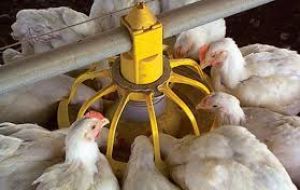MercoPress. South Atlantic News Agency
US to faze out use of antibiotics in animals for meat as resistant diseases keep rising
 In the US many cattle, hog and poultry producers give antibiotics regularly to ensure they are healthy grow faster
In the US many cattle, hog and poultry producers give antibiotics regularly to ensure they are healthy grow faster Citing a potential threat to public health, the United States Food and Drug Administration is taking steps toward phasing out the use of some antibiotics in animals processed for meat. In the US many cattle, hog and poultry producers give their animals antibiotics regularly to ensure that they are healthy and to make the animals grow faster.
Now FDA has announced that it will ask pharmaceutical companies to voluntarily stop labeling drugs important for treating human infection as acceptable for that growth promotion in animals.
If the drug companies sign on — and two major companies have already signaled they will — using those antibiotics to promote growth in animals would be illegal. Prescriptions would be required to use the drugs for animal illnesses.
The FDA has been debating how to address the issue of antibiotics in meat for several years as antibiotic-resistant diseases have risen and consumers increasingly have clamored for antibiotic-free meat. McDonald's, among other companies, has moved to limit the drugs in their meat, pushing many animal producers to go along. The restaurant chain Chipotle also has tried to use meat raised without antibiotics, but has cited challenges in finding enough of it.
FDA officials said the move is designed to limit antibiotic-resistant diseases in humans as antibiotic resistance has become a growing public health problem. Repeated exposure to antibiotics can lead germs to become resistant to the drug so that it is no longer effective in treating a particular illness.
In September, the Centers for Disease Control and Prevention released sobering estimates that more than 23,000 people a year in the US are dying from drug-resistant infections. The biggest risk is from germs spread in hospitals, and it's not clear how much of the problem is related to the use of drugs in meat. Still, the FDA says this is one step toward decreasing resistance.
“We need to be selective about the drugs we use in animals and when we use them,” said William Flynn of FDA's Center for Veterinary Medicine. “Antimicrobial resistance may not be completely preventable, but we need to do what we can to slow it down.” The new guidance will give the companies three years to comply.
Michael Taylor, FDA's deputy commissioner of foods, said he believes asking industry to make the changes is the fastest way to help phase the drugs out. If the FDA made the process mandatory, he said, the agency would have had to move forward with a complex regulatory process that could take years.
“We have high confidence based on dialogue with industry that this initiative will succeed,” Taylor said.
Drug companies Zoetis and Elanco, two of the leading manufacturers of animal antibiotics, have signaled they will comply.
The American Academy of Pediatrics said the move will be particularly helpful for children, who already are limited in the number of antibiotics they can take.
“When one type of antibiotic is found to be resistant to a strain of an infection, some of our sickest young patients are left without life-saving treatment options,” said Thomas K. McInerny, the group's president.




Top Comments
Disclaimer & comment rules-

-

-

Read all commentsThe use of ALL artificial animal growth enhances should be prohibited.. Of course that's no reason not to treat sick animals with antibiotics and indeed as farmers we have a duty to keep our stock healthy
Dec 13th, 2013 - 01:34 pm 0I think in USA,the growth hormone Zeranol is still legal, in spite of this drug having a consequence of increased breast cancer in women who eat beef so treated.Here in Uruguay its use has been banned for over a decade
We have to keep a register of all treatments we give our cattle, whether anti helmentic or otherwise.
As all 12 million catle are tagged electronically, it's fairly easy to discover at slaughter analysis if someone has broken the rules
Our selling slogan on the international markets is “Uruguay Natural” and it is trusted
For this reason, Uruguayan beef commands a premium on the usual international price
On an allied subject, cattle are ruminants by nature. If you start feeding them with half cooked sheeps brains you are asking for trouble as evidenced by the outbreaks of BSE and it's subsequent transmission to humans
@ 1 redp0ll
Dec 13th, 2013 - 02:57 pm 0Excellent post.
And we all know why the sheep’s brains were “hal-cooked” don’t we? The UK processors wanted to “improve” their fuel efficiency and convinced the forerunner of DEFRA to allow the process temperatures to be reduced.
No testing, no real discussion and now the UK are really in it.
2 ChrisR
Dec 13th, 2013 - 03:25 pm 0You say“ And we all know why the sheep’s brains were “hal-cooked” don’t we?”
Thank you for sharing your personal life experiences.
Commenting for this story is now closed.
If you have a Facebook account, become a fan and comment on our Facebook Page!